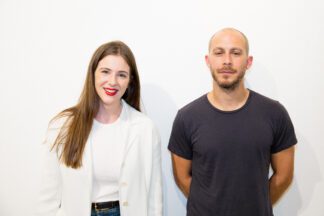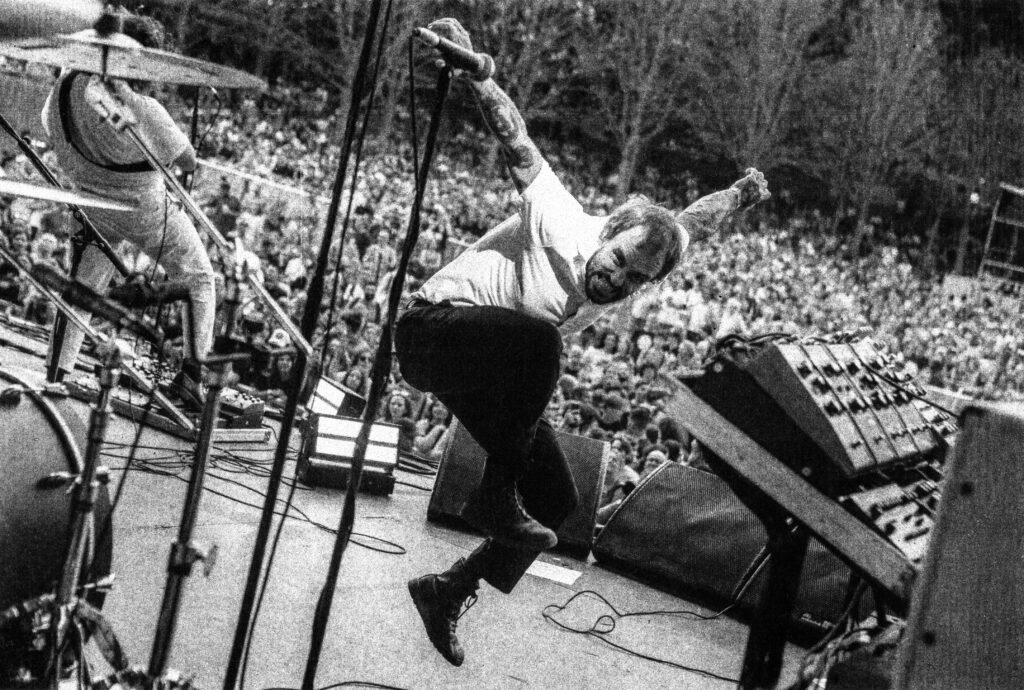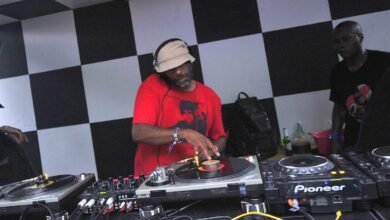Partisan Records is the most influential label you’ve probably never heard of


The five members of Geese, arguably the buzziest homegrown Brooklyn rock band in years, were flooded with record label attention after they graduated from high school in 2020. They got very close to signing with Sub Pop, home of bands as big as Nirvana and The Shins, and 4AD, which made a name for itself in the 1980s with famous new wave acts and has since repped artists like Bon Iver and St. Vincent.
But at the last minute, the band met with Tim Putnam, the co-founder of Brooklyn’s lesser-known Partisan Records, “almost out of obligation.”
“Every other label up to that point was like ‘We’re here for you, we’re here for your vision.’ And we had gotten used to hearing that,” Geese frontman Cameron Winter tells Brooklyn Magazine. “And then Tim was just like, ‘I’m not here for your vision. I’m here to make you a big band that makes money and does what you want, that makes money on your terms.’”
That pitch appealed to the teenagers who wanted partners in the process of becoming a successful touring act. And the more they looked into Partisan’s relatively brief history — it was founded in 2007 — the more they were impressed with its eclectic output: the chart-climbing British punks IDLES, indie electronic darlings Sylvan Esso, the catalog of Afrobeat pioneer Fela Kuti and the latest album by 90s rock queen PJ Harvey, alongside many more (and more obscure) releases.
“I just remember we got off the call and we were like, ‘This feels different,’” Winter says. “This label, they are from Brooklyn, and we were too, and they felt like they had a really good track record for a label as young as they were.”
They signed with Partisan soon after and have since fit in perfectly on the label’s weird-but-it-somehow-works roster. On November 11, the band packed Brooklyn’s Warsaw venue for their largest show yet. One band member wielded a keytar as Winter wailed on their raucous song “2122”: “Voodoo balarama baba yaga, I’m taking my love to the outside!”
‘A crucially keen sense of taste’
Over the past decade, Partisan Records has become one of the top music tastemakers in the city — and, arguably, the world — from a small office space with a peeling floor that sits right next to the Brooklyn-Queens Expressway in Williamsburg. Their artists are a wild card mix of up-and-comers like Geese, avant-garde projects and indie powerhouses. Others include Cigarettes After Sex, a dream pop trio that sells out arenas; Ezra Collective, a jazz group that won last year’s Mercury Prize, Britain’s most prestigious music award; Fontaines D.C., a Grammy-nominated Irish post-punk band; and Witch, an influential Zambian psychedelic rock band from the ’70s that last year released its first album in decades.
“I have always looked to them for a crucially keen sense of taste,” says Sam Duke, the general manager of DFA Records, co-founded by LCD Soundsystem’s James Murphy. “To use a terrible sports metaphor, it’s like skating to where the puck is going … sort of like seeing where things need to go or should go and already being there.”
Simon Vozick-Levinson, deputy music editor at Rolling Stone, says that “If you see that a band is being released by [Partisan], that’s something that might make you want to check them out.”
Most labels stick to a niche: either they are giant corporations, focused on signing the biggest acts in the world; or they are tiny, local passion projects that sign whomever they like, without expectations of making money; or they establish themselves as influential indie mainstays, like 4AD, which stick to the most successful independent artists.
Partisan aspires to be all three. It’s a tough tightrope to walk. The goal is to keep thinking big (find the next Cigarettes After Sex — a huge but also acclaimed act that doesn’t compromise on the type of art they want to be associated with) while continuing to sign the experimental and less financially viable bands with audience growth potential.
Vozick-Levinson says that even while they have had lucrative “success stories,” Partisan has shown “a really admirable commitment to still continuing to sign smaller, distinctive rising bands — not based on how great their streams are. Just bands that are good.”
Winter pointed to Lip Critic, an abrasive electronic group with two drummers, as an example of an underground band he loves on the label.
“I make a joke all the time,” says Winter. “Whenever Partisan picks up a bar tab or something like that, I say ‘Thank you, Cigarettes After Sex.’”

Partisan’s Zena White and Tim Putnam (Photo by Kevin Condon)
The road to Brooklyn
Over the course of his first decade in the music industry, Tim Putnam — who has the youthful air of a skateboarder — had no intentions of starting a record label. It was a windy road to get to Brooklyn: After growing up in the Portland area and dropping out of two different colleges in Oregon, he started the band The Standard, which put out five indie rock albums between 2001-2008. He moved to North Carolina, where his band’s label at the time, Yep Roc, was located, before moving to Williamsburg in the mid-2000s. (His first apartment, coincidentally, was located on Putnam Avenue.)
There was an international detour, too — just before forming the band, he studied abroad at Sydney University. While there, he worked at Mushroom Records, Australia’s biggest indie label, and got his first taste of the other side of the industry.
But he didn’t move to New York thinking he’d start a label. He was working on his next album, and through a friend, he got a job working at the door at the Knitting Factory’s flagship Manhattan venue. He worked his way up to night manager.
Putnam didn’t have a label to release his music on, until his friend Ian Wheeler, a writer, approached him with a new idea: starting their own.
They found their first big act to sign one night at the Knitting Factory, when they saw folk rockers Deer Tick perform. “I was waiting for something, and I saw [frontman] John [McCauley] play, and it was like somebody hit me in the head with a hammer, watching him perform,” Putnam says.
After the show, Putnam began regularly taking a bus up to Providence, where Deer Tick was based, hoping to convince them to sign with Partisan. The band’s former label had dropped them and still owed them royalties. Partisan would re-release Deer Tick’s debut album “War Elephant,” which sold tens of thousands of copies. “If we wouldn’t have done that, this label wouldn’t exist,” Putnam said.

IDLES has become one of the biggest bands in the U.K. (Photo by Tom Ham)
‘A healthy dose of ambition’
Other key finds in the mid-2010s included the short-lived British post-punk band Eagulls — which put them on the track to signing IDLES and Fontaines D.C. — and Sylvan Esso, whose debut album on Partisan reached #39 on the Billboard 200 chart. Since then, Partisan acts have racked up awards and even No. 1 albums in the U.K. The label has an office in London, now with over a dozen employees.
But it’s clear from talking with Putnam and Zena White, Partisan’s chief operating officer, that they have their sights set higher. Putnam says the label’s upcoming releases over the next year could “change some of the conversations that are happening” in the industry. One highly-anticipated album is IDLES’ “Tangk,” which was produced by Radiohead’s longtime collaborator Nigel Godrich and drops in February.
The drive is fueled by what they see as potential for every band they work with, even the most successful, to grow as artists.
“We have a healthy dose of ambition,” White says. “That ambition is not driven in any way by status. It is driven by the need to achieve potential and to not want to waste that opportunity.”
That includes being brutally honest with artists when they feel the artists aren’t fulfilling their promise. Winter says that when he showed Putnam the first draft of the latest Geese album, “3D Country,” he had suggestions.
“They were like, ‘you know, if you put the albums that you’ve presented to us, with no changes…we’ll support it. But if you want to be shrewd about it, you can push this sound in a different direction that is more suited to a band with your aspirations,’” Winter recalls.
The group went back in the studio and recorded “Cowboy Nudes” and “I See Myself,” which are now their two most popular songs.
After Geese’s Warsaw show, Putnam hung around as fans filtered out, looking at the stage pensively. The crowd had loved the performance, but something about the band’s live sound was lacking for Putnam. There was still work to be done.
Maybe it was the bass-heavy mix that they had set up, a reporter suggested. “Yeah,” nodded Putnam. “I was thinking the same thing.”
The post Partisan Records is the most influential label you’ve probably never heard of appeared first on Brooklyn Magazine.




